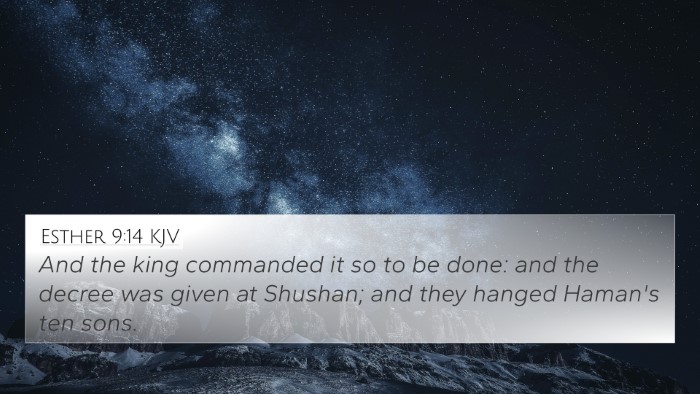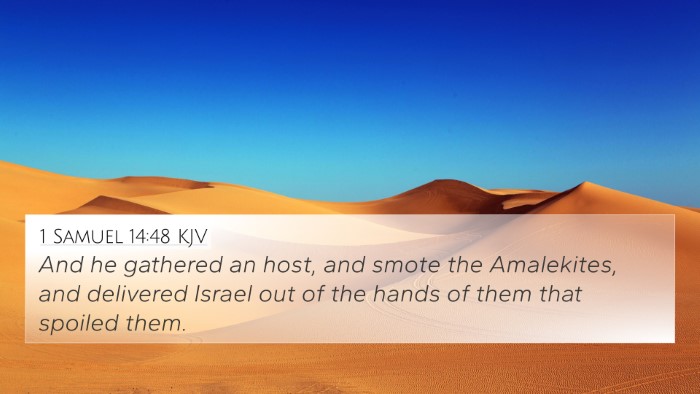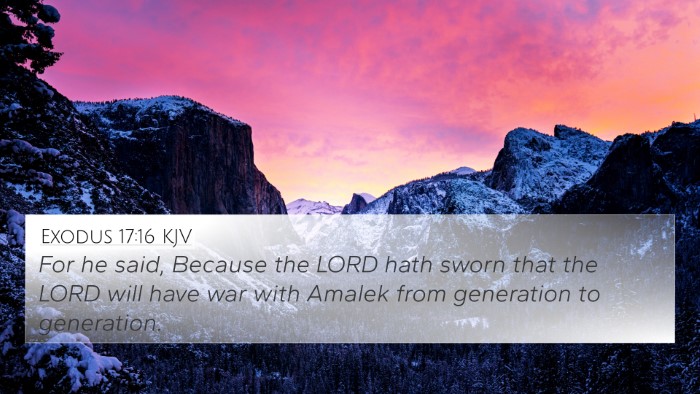Understanding Numbers 24:20
Numbers 24:20 states: "And when he looked on Amalek, he took up his parable, and said, Amalek was the first of the nations; but his latter end shall be that he perish for ever." This verse is rich in implications regarding God's judgment and the fate of nations, particularly in reference to Amalek.
Summary of Biblical Context
In this context, Balaam, a non-Israelite prophet, is speaking under divine influence about the nation of Amalek. This verse emphasizes the idea that although Amalek was prominent at one time, their eventual destruction is foretold. The significance of nations rising and falling is a recurring theme throughout the Bible.
Commentary Insights
- Matthew Henry: Henry notes that Amalek represents opposition against God's people. The prophecy reflects God's awareness of nations that act contrary to His will, and it highlights the doomed fate of those who oppose His people.
- Albert Barnes: Barnes emphasizes the historical backdrop of Amalek being the first nation to oppose Israel during their exodus from Egypt. His commentary explains that the reference to Amalek’s destruction serves as a warning against nations that oppose God’s covenant.
- Adam Clarke: Clarke elaborates on the significance of Amalek’s position as "the first of the nations,” suggesting that their initial strength brings a sense of caution regarding pride and opposition to God's will. Clarke’s interpretation calls attention to God’s ultimate sovereignty over human affairs.
Thematic Connections
This verse links to broader themes in scripture regarding divine justice, the fate of nations, and opposition to God's chosen people. Below are thematic connections through cross-referencing other Biblical texts:
Bible Verse Cross-References
- Exodus 17:14-16: This passage recalls the fight against Amalek and highlights God's command to remember Amalek's opposition.
- Deuteronomy 25:17-19: Focuses on God's call for Israel to remember Amalek's actions and to eradicate their memory from under heaven.
- 1 Samuel 15:2-3: God commands King Saul to destroy the Amalekite people, showcasing God's ongoing judgment against Amalek.
- Psalm 83:4: The psalmist expresses a desire for the enemies of God, including nations similar to Amalek, to be defeated.
- Genesis 14:7: Mentions Amalek in the context of the kings and battles during Abraham’s time, positioning them as a longstanding hostile tribe.
- Matthew 2:16: Though not a direct reference to Amalek, Herod's actions in attempting to kill the Christ child represent ongoing hostility toward God's plans.
- Revelation 20:10: Discusses the eternal fate of the adversaries of God which parallels the destruction foretold for Amalek.
Importance of Cross-Referencing
Understanding Numbers 24:20 through cross-referencing provides deeper insights into the broader narrative of the Bible. It engages readers with the historical and prophetic nature of scriptures, allowing for comparative biblical verse analysis. Utilizing tools for Bible cross-referencing can enhance one’s study, revealing nuances in the biblical text across both Old and New Testaments.
Tools for Bible Cross-Referencing
To fully explore these connections, consider the following:
- Bible Concordance: This tool aids in finding specific words and their occurrences, making it easier to connect related verses.
- Cross-Reference Bible Study: Structured guides and methods for finding and studying verses that relate to each other.
- Inter-Biblical Dialogue: Engaging with themes that appear throughout the entirety of the Bible for a holistic understanding.
- Bible Chain References: Following a chain of thematic references helps in understanding the contextual relationships within scripture.
Conclusions
In summary, Numbers 24:20 serves as a poignant reminder of the consequences of opposition to God's will, particularly as exemplified through the nation of Amalek. This verse not only stands on its own but also invites numerous connections and insights through cross-referencing with other key biblical texts. By engaging profoundly with these connections, individuals can enhance their understanding of scripture, driving home the message of God's justice and the importance of aligning with His sovereign purposes.















